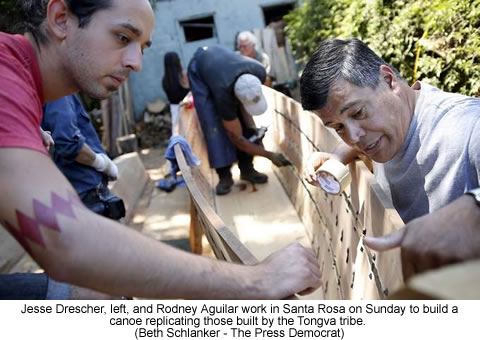 |
Canku Ota
|
 |
|
(Many Paths)
|
||
|
An Online Newsletter
Celebrating Native America
|
||
|
August 2013 - Volume
11 Number 8
|
||
|
|
||
|
Canoe Project Symbolizes
'Cultural Revitalization' for Native Americans
|
||
|
by Kevin McCallum -
The (Santa Rosa, CA) Press Democrat
|
||
|
The band of amateur boat builders who've been creating the rare replica a Native American vessel are also rebuilding a sense of community shattered by history. "This is a symbol of our cultural revitalization," said L. Frank Manriquez, an artist and member of the tiny Tongva tribe, whose homeland is in present day Los Angeles. Manriquez, 61, is the architect of an effort to construct an 18-foot sewn plank canoe and paddle it down the coast of Washington State as part of a gathering of Native American peoples next week at the Quinault Indian Nation. Building the craft is something she's had in the back of her mind since 1989, when she was part of a similar project by Tongva tribe's neighbors to the north, the Chumash. Sewn plank canoes were common in Polynesian culture but rare in North America, built only by the Tongva and Chumash. Since large trees suitable for boat-building were hard to come by in their coastal areas, the tribes sewed together smaller pieces of wood, usually driftwood from redwood trees, sealing the seams with pitch tar abundant in the area, explained Jesse Drescher, a Tongva member and student in Olympia, Wash. He's one of several people helping on the project who are descended from far-flung tribes, including Pomo and Wappo from California, Navajo from the Southwest, Tlingit from the Pacific Northwest and Choctaw from Oklahoma. Drescher has been reconnecting with his tribal roots of late, including learning from Manriquez, a tribal scholar and expert in native language preservation, how to speak the largely extinct Tongva tongue. His right forearm bears a new tattoo in a red diamond pattern as a testament to his deepening tribal identity. The building of the canoe, or ti'aat, is an extension of that effort to help native peoples reconnect with their tribal traditions. "People don't know how to be a community anymore," Manriquez said. Work on the craft started several weeks ago after they were able to secure a supply of redwood from a donor in Gualala named Mark Stillman, who milled most of it into 1x6 lengths. For other project costs, the group secured a modest grant from the Christensen Fund in San Francisco, a private organization that supports biocultural diversity. With the help of Ethan Castro, a member of the Round Valley tribe, the redwood boards were bent using a home-made steamer in Manriquez's garage, and joined together using marine glue and stitches. The seams were sewn together with hundreds of individual high-tension stitches made of nylon line, all of which were then sealed with roofing tar. Over the weekend, the team was working hard to put the finishing touches on the 400-pound craft, which still had many stitches unsealed and had yet to be stained or decorated. The goal was to have it ready for the open road by Tuesday morning, but Manriquez admitted it was going to be close. "Everything's drying on the drive. Even the laundry," she said. Time is of the essence because the plan is to begin their journey at Neah Bay at the northwest corner of the Olympic Peninsula on Friday. From there four paddlers will travel more than 100 miles south to Point Grenville on the Quinault territory, where dozens of boats from Pacific Rim tribes will land and participate in a five-day celebration known as a potlatch. They've made some modifications they hope will help their vessel handle the open waters of the Pacific, including wings that should act to buoy her through waves and a 2-inch keel carved into her otherwise flat bottom. As she admired the long, narrow craft taking shape in her front yard, Manriquez was confident of one thing: "She's going to be fast." |
|
|
||
|
|
||
| Canku Ota is a free Newsletter celebrating Native America, its traditions and accomplishments . We do not provide subscriber or visitor names to anyone. Some articles presented in Canku Ota may contain copyright material. We have received appropriate permissions for republishing any articles. Material appearing here is distributed without profit or monetary gain to those who have expressed an interest. This is in accordance with Title 17 U.S.C. Section 107. | ||
|
Canku Ota is a copyright ©
2000 - 2013 of Vicki Williams Barry and Paul Barry.
|
||
 |
 |
|
|
The "Canku
Ota - A Newsletter Celebrating Native America" web site and
its design is the
|
||
|
Copyright ©
1999 - 2013 of Paul C. Barry.
|
||
|
All Rights Reserved.
|
||
 More
than just a canoe has been under construction in the front yard
of a home on Corby Avenue.
More
than just a canoe has been under construction in the front yard
of a home on Corby Avenue.